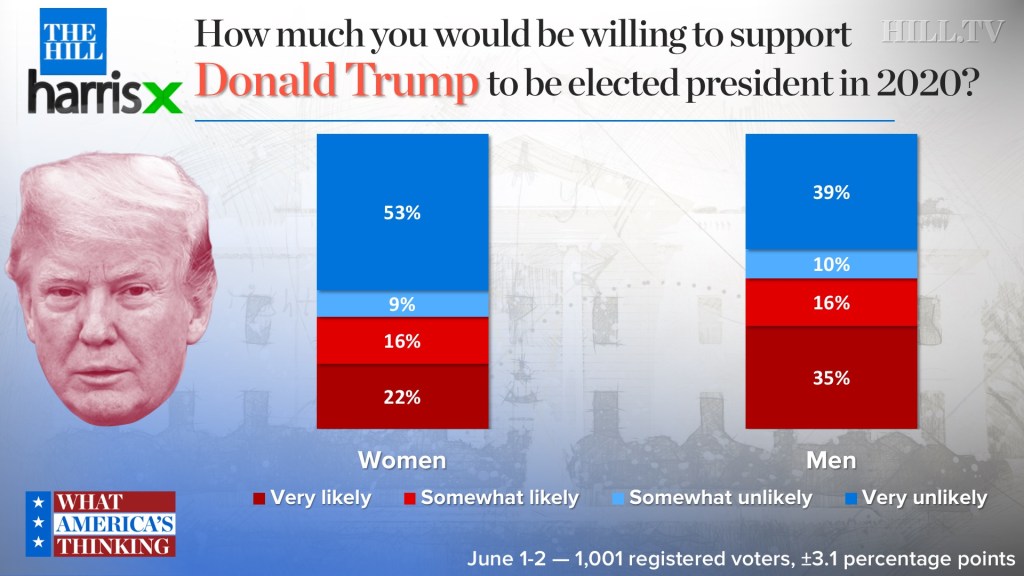In a new poll, a significant majority of American women who are registered to vote say they are not likely to support President Trump’s re-election effort in 2020, setting him up with a gender gap that may prove difficult to overcome.
In a June 1-2 Hill-HarrisX survey, 62 percent of female registered voters said they were unlikely to support Trump’s bid to obtain a second term. Fifty-three percent said they were very unlikely to back Trump while 9 percent said they were somewhat unlikely. Thirty-eight percent of women who participated said they were likely to back Trump.
In the 2016 election, exit polls indicated that 41 percent of women who voted chose Trump meaning that he has likely lost some support from women during his presidency.
The survey found that male voters were more evenly split about re-electing the president with 51 percent of respondents saying they were either somewhat or very likely to support him and 49 percent saying they were somewhat or very unlikely to support Trump, within the poll’s 3.1 percent sampling margin of error.
A majority of women of all age groups said they would decline to support Trump while men’s opinions differed based upon their ages. A 57 percent majority of men between 18 and 34 said they were unlikely to support Trump while a narrow majority of men 35 and up, 54 percent, said they were likely to support the president.
 When both sexes are combined, 56 percent of all registered voters said they would be unlikely to back Trump’s re-election while 44 percent said they would be likely to.
When both sexes are combined, 56 percent of all registered voters said they would be unlikely to back Trump’s re-election while 44 percent said they would be likely to.
Long-term polling from the Pew Research Center and others has indicated that women have been more favorable to the Democratic Party but Trump’s particular style has accelerated the trend. A large-scale sample the Center conducted in 2018 found that a majority of women identify as Democrats or are independents who lean toward the party.
The Hill-HarrisX survey also found that Democratic presidential candidates Joe Biden and Sen. Bernie Sanders (I-Vt.) had approximately similar potential levels of support as Trump.
Fifty percent of voters said they were somewhat or very likely to support the former vice president while 42 percent said the same about Sanders.
A majority of women, 53 percent, said they were likely to support Biden while 44 percent said the same about Sanders. Forty percent of women said they were likely to oppose Biden while 49 percent said they were likely to oppose Sanders. About 7 percent of women said they did not know who Sanders was while 6 percent said this about Biden.
Men were fairly evenly split about Biden with 47 percent saying they expected to support him while 49 percent said they were likely to oppose the former veep. They were more against Sanders, with a majority of 58 percent saying they were likely to oppose the Vermont senator while 39 percent said they expected to support him. Three percent of male respondents said they did not know Sanders while 4 percent said the same about Biden.
Among respondents who identified as Democrats, Biden generated more enthusiasm and less opposition. Seventy-nine percent said they were likely to support the onetime Delaware senator while 69 percent said they expected to support Sanders.
Twenty-seven percent of Democratic voters said they likely to oppose Sanders while 16 percent said they were likely to oppose Biden.
Among Republican voters, 81 percent said they were likely to support Trump while 19 percent said they were likely to oppose him. When asked separately about Biden and Sanders, nearly a fourth of GOP respondents, 23 percent, said they expected to support the former vice president while 15 percent said they were likely to support the Vermont senator.
—Matthew Sheffield
hilltv copyright
